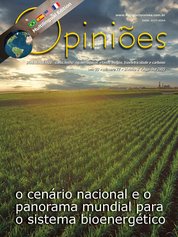Wilson Lucena
Diretor Industrial da BP Bunge Bioenergia
OpAA77
Investimentos em tecnologia e melhoria contínua sustentam os desafios do setor sucroenergético
Os debates em torno da transição energética, entendida atualmente como uma incontestável necessidade global, têm gerado uma grande visibilidade para o setor sucroenergético. Isso porque os biocombustíveis desempenham um papel central neste cenário, uma vez que sua eficiência é mais do que comprovada a diminuição significativa da emissão de gases de efeito estufa na atmosfera.
Dados da UNICA - União da Indústria de Cana-de-Açúcar e Bioenergia,
indicam que o uso do etanol, por exemplo, evitou a emissão de 630 milhões de CO2 desde 2003, quando foi lançada a tecnologia flex. Além disso, o etanol de cana-de-açúcar, combinado com a Bioenergia com Captura e Armazenamento de Carbono (BECCS), pode reduzir liquidamente as emissões de CO2, contribuindo ainda mais para a descarbonização global.
Para citar um dado interno, na BP Bunge Bioenergia, com o etanol e a bioenergia produzidos em apenas uma de nossas safras, foi possível contribuir para evitar a emissão de 1,7 milhões de toneladas de gases nocivos ao meio ambiente, o equivalente à retirada de um milhão de veículos do trânsito.
Esse panorama de oportunidades – e de responsabilidade – frente a um tema tão importante para o mundo inteiro, nos coloca diante da necessidade de ampliarmos nossos esforços em torno do desenvolvimento das atividades deste setor tão estratégico, o que começa com uma lição de casa de cada agente que o compõe, no sentido de buscar melhorias que possibilitem cada vez mais ganhos em termos de eficiência, produtividade e competitividade.
Na BP Bunge, esta é uma questão central desde a fundação da companhia, há três anos, tanto que a excelência operacional é um dos 12 temas prioritários que compõem a nossa agenda Nossos Compromissos 2030, um mapa estratégico que tangibiliza a jornada traçada pela companhia rumo a uma evolução para patamares cada mais sustentáveis em todos os aspectos.
Falando especificamente sobre nossa operação industrial, a busca pela excelência está concentrada nas pessoas, com um time de profissionais competentes e comprometidos em fazer o seu melhor, sempre de forma segura, tendo como Norte na prática diária as premissas de nossa cultura, segundo a qual “se não for seguro, qualquer pessoa pode parar a operação”.
Além disso, com a evolução da tecnologia, a indústria sucroenergética tem ficado cada vez mais moderna e integrada, o que permite aprimorar a operação por meio de processos da chamada Indústria 4.0. Sistemas de Inteligência Artificial, IoT (Internet das Coisas) e Computação em Nuvem, recursos que se tornam facilitadores para a tomada de decisões, permitindo agregar mais valor ao negócio.
Um indicador importante para a indústria é o uptime que, na prática, representa o aproveitamento do tempo industrial. Em outras palavras, a capacidade que as usinas têm para processar a cana-de-açúcar, sem interrupções.
Para isso, contamos com soluções de monitoramento on-line, cujo objetivo é garantir que os equipamentos não falhem. Para isso, contamos com um sistema de gestão por automação a partir do qual temos instalados hoje cerca de 1.300 sensores on-line voltados à manutenção de pontos críticos da operação – outros 2.700 serão instalados em 2023, totalizando 4 mil sensores que nos dão informações importantes, como possíveis falhas de equipamento, por exemplo.
Na unidade Frutal-MG, já tivemos um ganho de 10% na geração de energia elétrica a partir da utilização dessa tecnologia, que também funciona nas usinas Tropical-GO e Itumbiara-GO. O planejamento prevê a implantação deste sistema em todas as usinas até 2025.
Este tipo de investimento é extremamente estratégico, uma vez que aumenta a confiabilidade e eficiência durante a safra, evitando interrupções não programadas na produção, e ainda gera mais segurança, diminuindo a exposição dos colaboradores a qualquer tipo de risco – fator este de vital importância para a nossa companhia.
Outro destaque que contribui para nossos bons indicadores industriais é que a cada safra aprimoramos nosso planejamento e comissionamento na retomada da entressafra, um diferencial da companhia.
Investimos tempo e recursos financeiros nessa etapa, pois ela garante a execução de um plano de manutenção abrangendo ações preditivas, preventivas e corretivas dos equipamentos das usinas, com especial atenção ao período de entressafra, em que a cada ano são realizadas cerca de 68.000 atividades.
Outro ponto que considero importante quando falamos na busca pela excelência operacional é nosso programa de melhoria contínua – o Transforma – que visa otimizar a performance operacional por meio da identificação, mediação e eliminação de problemas.
Criado a partir de um Sistema de Gestão Integrado (SGI), que padroniza processos e diretrizes operacionais em todas as nossas unidades, o programa já originou soluções que representaram retornos financeiros de milhões para a empresa.
Os exemplos de iniciativas que materializam essa jornada rumo à estruturação para bem atender o mercado no desafiador cenário da transição energética são inúmeros e envolvem diferentes aspectos, com destaque obviamente para o avanço tecnológico.
Mas é fato que, mesmo com todas as melhorias que ainda podem ser implementadas – e muito está sendo feito nesse sentido, o setor sucroenergético já é capaz de atender imediatamente as demandas da sociedade para a construção de uma economia de baixo carbono, diminuindo as emissões nocivas para o meio ambiente por meio de tecnologias que já são uma realidade, trabalhadas num setor estruturado e comprovadamente eficiente.




